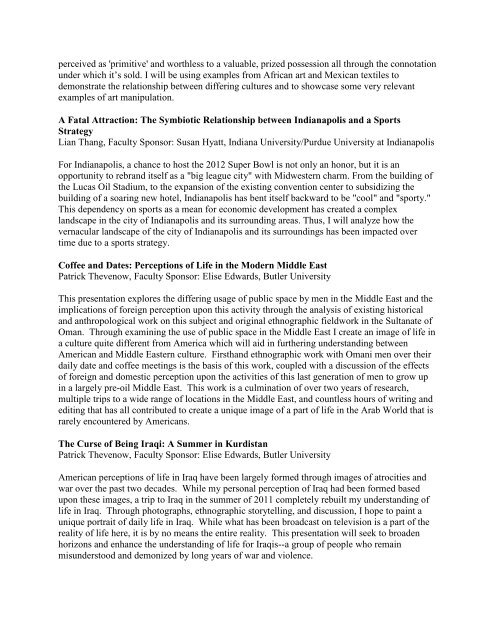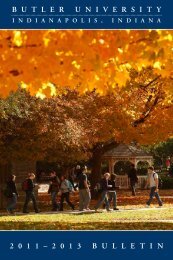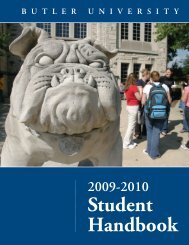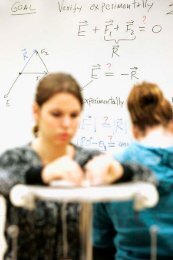Anthropology - Butler University
Anthropology - Butler University
Anthropology - Butler University
Create successful ePaper yourself
Turn your PDF publications into a flip-book with our unique Google optimized e-Paper software.
perceived as 'primitive' and worthless to a valuable, prized possession all through the connotation<br />
under which it’s sold. I will be using examples from African art and Mexican textiles to<br />
demonstrate the relationship between differing cultures and to showcase some very relevant<br />
examples of art manipulation.<br />
A Fatal Attraction: The Symbiotic Relationship between Indianapolis and a Sports<br />
Strategy<br />
Lian Thang, Faculty Sponsor: Susan Hyatt, Indiana <strong>University</strong>/Purdue <strong>University</strong> at Indianapolis<br />
For Indianapolis, a chance to host the 2012 Super Bowl is not only an honor, but it is an<br />
opportunity to rebrand itself as a "big league city" with Midwestern charm. From the building of<br />
the Lucas Oil Stadium, to the expansion of the existing convention center to subsidizing the<br />
building of a soaring new hotel, Indianapolis has bent itself backward to be "cool" and "sporty."<br />
This dependency on sports as a mean for economic development has created a complex<br />
landscape in the city of Indianapolis and its surrounding areas. Thus, I will analyze how the<br />
vernacular landscape of the city of Indianapolis and its surroundings has been impacted over<br />
time due to a sports strategy.<br />
Coffee and Dates: Perceptions of Life in the Modern Middle East<br />
Patrick Thevenow, Faculty Sponsor: Elise Edwards, <strong>Butler</strong> <strong>University</strong><br />
This presentation explores the differing usage of public space by men in the Middle East and the<br />
implications of foreign perception upon this activity through the analysis of existing historical<br />
and anthropological work on this subject and original ethnographic fieldwork in the Sultanate of<br />
Oman. Through examining the use of public space in the Middle East I create an image of life in<br />
a culture quite different from America which will aid in furthering understanding between<br />
American and Middle Eastern culture. Firsthand ethnographic work with Omani men over their<br />
daily date and coffee meetings is the basis of this work, coupled with a discussion of the effects<br />
of foreign and domestic perception upon the activities of this last generation of men to grow up<br />
in a largely pre-oil Middle East. This work is a culmination of over two years of research,<br />
multiple trips to a wide range of locations in the Middle East, and countless hours of writing and<br />
editing that has all contributed to create a unique image of a part of life in the Arab World that is<br />
rarely encountered by Americans.<br />
The Curse of Being Iraqi: A Summer in Kurdistan<br />
Patrick Thevenow, Faculty Sponsor: Elise Edwards, <strong>Butler</strong> <strong>University</strong><br />
American perceptions of life in Iraq have been largely formed through images of atrocities and<br />
war over the past two decades. While my personal perception of Iraq had been formed based<br />
upon these images, a trip to Iraq in the summer of 2011 completely rebuilt my understanding of<br />
life in Iraq. Through photographs, ethnographic storytelling, and discussion, I hope to paint a<br />
unique portrait of daily life in Iraq. While what has been broadcast on television is a part of the<br />
reality of life here, it is by no means the entire reality. This presentation will seek to broaden<br />
horizons and enhance the understanding of life for Iraqis--a group of people who remain<br />
misunderstood and demonized by long years of war and violence.
















